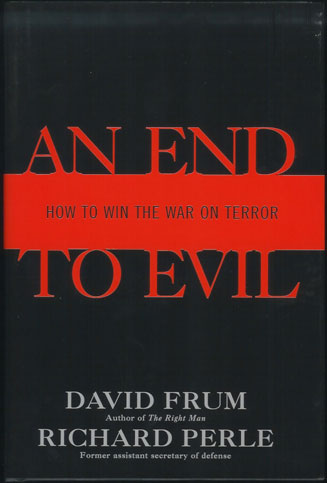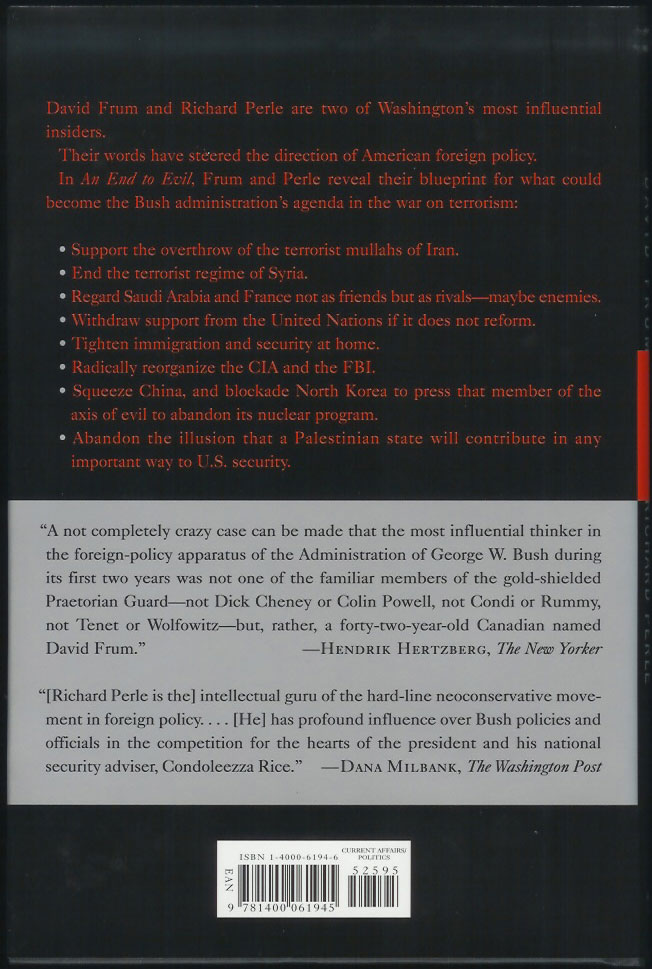|
An End To Evil
How to Win the War on Terror
by David Frum and Richard Perle
Published 2003 in the United States

This book is a manifesto for the Bush presidency. When
reading it I find myself amazed that the authors are putting some of
this in print, and yet I then realize that all manifestos have been put
into print before they were executed, be it the Communist Manifesto or
Mein Kampf. This is the manifesto of the "New American Right."
As you may or may not know, I published my view of what
the war in Iraq was "really about" on the internet in April of 2003 in
the document that became the basis for this website, This War is
About So Much More. I would never have imagined that a book written
by the men perusing the war would be the book to validate my assessment
of the war.
In March 2003 I wrote that:
"This war on Iraq was really designed to be a war on
the European Union, OPEC, and the UN as much as a war on Iraq. It was
designed to indirectly attack the EU and UN via the Iraqi situation. The
three primary goals were to secure American influence in the Persian
Gulf, weaken the EU and UN, and gain increased influence over OPEC."
When I made that claim I never imaged that I would ever be
able to "positively" prove it, yet this book, written by David Frum and
Richard Perle, loudly proclaims it.
This book presents a world consisting of only two types of
nations, those that are our friends, and anti-American states whose
primary objective is the destruction of the United States for reasons of
jealousy or evil will. The continuing message throughout the book is one
of immediate threat and the need to take fast action against a world out
to destroy America. At times I found myself wondering if the authors are
in fact even sane, yet at other times seemingly reasonable points are
made, most reasonable if you don't have a knowledge of the history
related to the points. The book repeatedly points out "leftist" policy
or "leftist" comments, or the actions of "irrational liberals", which
are sometimes, very, very tenuously, tied to negative events or policy.
It paints a picture of everything over the past 20 years that "could
have gone right" if only not for the interference or poor judgment of
"the liberals" and bureaucracy, and never acknowledges any negative
impacts from "right-wing" leadership, only pointing out times when
conservatives have been "too compassionate" for their own good, having
tried too hard to please everyone, something which is clear that the
authors feel has to stop.
So, what exactly does the book propose?
Quick and decisive action against Syria, Saudi Arabia, and
Lybia, urging that "we don't have much time." Strong pressure on Iran,
North Korea and China. The challenging of the UN and a possible attempt
to breakup the European Union. A total restructuring of almost every
American diplomatic or intelligence agency.
In regaurd to Syria they state: "Really, there is only
one question to ask about Syria: Why have we put up with it for as long
as we have?"
The CIA and FBI, which have had serious problems and have
miscalculated and misinterpreted, they accuse of being too liberal, and
the measures they propose essentially stem from the claims that the
President and his advisors, men like Paul Wolfowitz, don't have enough
direct control, and are slowed down by bureaucracy and the desire of
these agencies to "proceed with caution."
Most importantly though, in my opinion, is the commentary
on Europe and the prospects of a cooperative global community. The
authors state that the international Desert Storm experience was "a
fluke", and that it would be "highly unrealistic to expect such a
thing to ever happen again." They go on to state:
"We can afford illusions no longer. We have a big
mission ahead of us. Let us ready ourselves for the task by examining
with clear eyes the roster of our supporters and our opponents, open and
disguised."
They also state:
"The United States has long supported European
unification. A united Europe, American policy makers believed, would
have a stronger economy and could better contribute to the common
defense against the Soviet Union."
"The possibility that the integrated Europe we had
nurtured for so long might emerge as a 'counterweight' to the United
States, particularly on the most sensitive issues of national security,
would never have occurred to the Eurocentric American foreign policy
establishment."
"So what should we do? These four things.
First, acknowledge that a more closely integrated
Europe is no longer an unqualified American interest."
They then go on to state:
"We must do our utmost to preserve our British ally's
independence from Europe."
...and on it goes.
This is a book every America should read, and fully
understand.
Every one of the points in this book falls directly in
line with the statements I have made about the war on Iraq on this
website. My assessment of this issue was developed before
the war even started, which is proof that the information needed to
understand the war was available, however, as of yet, I have still
not seen any public acknowledgement of this view on the
war, other than this book itself. This entire situation is yet still
further proof of the inadequate press and inadequate public debate on
these issues. None of the so called "experts" in the media are even
close to the issues, and it is the public, left in the dark, who is
paying the price.

|
 page views since January 21, 2004
page views since January 21, 2004